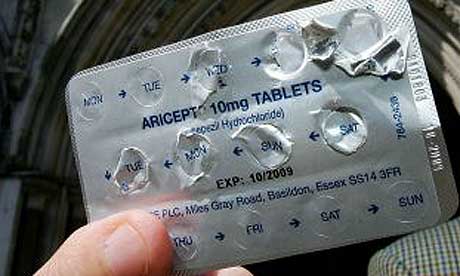
Tens of thousands of people with Alzheimer's will be provided with drugs by the NHS that may delay the onset of the disease after the government's health rationing body performed a U-turn.
After a three-year campaign by doctors, patients, families and the Alzheimer's Society, the National Institute of Health and Clinical Excellence (Nice) has agreed to make much more widely available the only drugs that can tackle the condition.
"This is a momentous day for people with Alzheimer's disease and their carers," said Ruth Sunderland, the society's interim chief executive.
The medications – Aricept, Exelon and Reminyl – which cost £2.80 a day per patient, can help patients retain their mental faculties longer. Sufferers who already use them say they can act like "a fog lifting" and help them remember things such as their grandchildren's names, how to make a cup of tea and their home address.
Not all patients benefit from the drugs, but they have been shown to help some patients to varying degrees. "These drugs can help people have a better quality of life at all stages of the condition. While they don't work for everyone, small but important benefits can enable many people to recognise their loved ones for longer, play with their grandchildren or make vital plans for the future", said Sunderland.
Nice has decided to recommend that the three drugs can be prescribed to patients who have the mild form of the disease. The government's health advisers had controversially restricted them in 2007 to only patients with moderate stage Alzheimer's. That decision, which was challenged in the high court, meant that people who were mildly affected by Alzheimer's had to wait until they became eligible to receive the drugs.
Nice's experts have also ruled that a fourth drug, Ebixa, should be made available for severe forms of the disease and some patients with moderate Alzheimer's. The body's revised stance on the drugs will apply across England and Wales. Patients should be able to start accessing them from next spring, but they are being advised to start talking to their GP now in preparation. There are some 465,000 people in the UK with Alzheimer's, and 62,000 are diagnosed every year. Numbers are set to rise dramatically due to the UK's ageing population.
Nice reveals its fresh thinking on the drugs through updated guidance which is currently in draft form, but is expected to gain final approval from its appraisal committee in November. "If this guidance is issued [in final form], doctors will no longer have to watch people deteriorate without being able to treat them," said Professor Clive Ballard, the Alzheimer's Society's director of research. The decision would incentivise doctors to diagnose the condition earlier and patients to visit their GP if they had concerns about their memory.
"Marvellous news – commonsense prevails," said Gordon Wilcock, professor of clinical geratology at Oxford University. The wider availability of the three drugs should rectify only patients who can afford a private prescription being able to access them, he added. "These are not wonder drugs but they have proven, albeit modest, symptomatic value and we should be able to offer them to all patients who may benefit," said Nick Fox, a professor of neurology at University College London.
Nice chief executive Sir Andrew Dillon said Nice felt able to change its stance because its "increased confidence in the benefits and costs associated with the use of the three drugs for treating mild and moderate stages of the disease has enabled us to make a positive recommendation for their use in mild disease". New evidence about the drugs' benefit in helping delay the time at which some patients have to enter care homes was a key factor in that equation.
Chris Hill, a retired geography teacher in March, Cambridgeshire, said his 60-year-old wife Angela, an ex-primary school teacher, had experienced a significant improvement in her mental faculties for months after taking Aricept. "Nice's decision will delay the advance of the symptoms of Alzheimer's disease. Aricept doesn't prolong life but it masks the symptoms, so that more of the person's personality is retained. They are more of the person that they were for longer, and for a relative or a carer – a wife, husband, son or daughter – that's massive, because Alzheimer's pulls on your heartstrings, because you witness the decline of your loved one," said Hill, whose wife's condition is now so severe that she has been in a care home since the summer.

